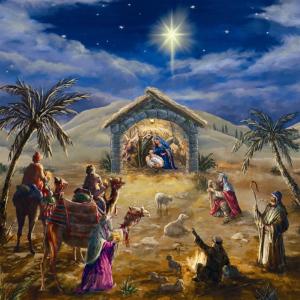
The picture perfect Nativity scene that we see on the front of Christmas cards (remember those?) is a long way from what originally happened when Jesus Christ was born two thousand years ago. Life in the ancient Middle East was hard. One of Matthew’s details hints strongly at this.
“Jesus was born in Bethlehem in Judea, during the reign of King Herod. About that time some wise men from eastern lands arrived in Jerusalem, asking, ‘Where is the newborn king of the Jews?…’ King Herod was deeply disturbed when he heard this…He sent soldiers to kill all the boys in and around Bethlehem who were two years old and under…”
Matthew 2:1-16, NLT
It’s not a very “Christmassy” detail this … is it? Infanticide at Christmas.
Sometimes skeptics look at the Nativity accounts and shake their heads in disbelief at the slaughter of these poor innocent baby boys. There’s not one shred of evidence that this massacre ever happened…outside of Matthew’s account, of course. It’s a fantasy, put in there to make Jesus seem more important.
Well I disagree. We have lots of evidence about Herod the Great. We know that sort of man he was and why Matthew’s account of the death of the innocents is very reasonable given the setting and the people at the time. We can be sure that Matthew got the details right in his account of Jesus birth.
Rich History:
The Roman historian Josephus wrote two whole book scrolls on the life of Herod the Great. This is a rich primary source of history. Herod seems to have been a remarkable keeper of the peace between Rome and Judea between around 40 BC and 4 BC, when it is thought that he died.
His legacy included the building of theaters and stadiums; he rebuilt the great temple in Jerusalem. He is responsible for the construction of the Masada fortress on the south west corner of the Dead Sea.
Paranoid Herod:
Yet what we also learn from Josephus is that King Herod also had a decidedly paranoid streak. He had a habit of “getting rid” of people who threatened the peace, or were in danger of “rocking the boat” for him.
His family was notoriously power hungry and violent. Herod killed some of his sons, who were apparently too ambitious. And he even got rid of one of his many wives…along with his mother in law.
But possibly the biggest indicator of Herod’s character can be seen in the plans he tried to put in place for his funeral. He feared that few people in Israel would mourn his passing. And so he decided to give his subjects something to mourn about. His plan was to fill one of his stadiums full of Jewish leaders, and order them to be massacred as a “celebration” of Herod the Great’s demise. He wanted to make absolutely sure that there would be great mourning across Israel at the time of his death.
This then is the backdrop to the birth of Jesus, and the arrival of the mysterious pagan Magi who announced to Herod that they wished to worship the newborn king of the Jews. Can you see how Herod the Great might have responded to them? When Matthew says he was “deeply disturbed” at this news…this is probably putting things politely. After all – Herod WAS the king of the Jews. And he eliminated anyone who tried to replace him.
Suddenly the “spray and pray” shotgun approach that Matthew describes…kill all the newborn children of Jesus age in Bethlehem…seems right up King Herod’s gruesome street. It’s just the sort of reaction we can expect from him.
So the question then is – why is there no evidence outside of Matthew’s gospel to record it?
Herod’s Likely Reaction to Jesus’ Birth:
I’ve heard it described like this. The murder of these babies was the ancient equivalent of a mugging on a New York subway train. So much happens in New York each day – it’s unlikely that a mugger is going to hit the front of the NY Times.
Josephus had such a rich and interesting history of Herod to record – particularly his spectacularly brutal plans for the stadium and the Jewish leaders – it is unlikely that a small localized event in a little village would get a look in.
Bethlehem is understood to have been a very small village at this time. It has been estimated that only around 24 children of the relevant age would have suffered at Herod’s hand. At a time when infant mortality would have been high – this is hardly big news. Perhaps Josephus didn’t even know that it happened. But just because an event is small in scale, doesn’t mean it is not hugely significant.
So – did it happen…or didn’t it? Well just because Josephus doesn’t mention it does not mean it never happened. By the way – Luke the historian doesn’t mention it in his account either. Yet absence of evidence is NEVER evidence of absence.
And besides – we DO have evidence that these babies died. We read it in Matthew’s first century account.
Paul L Maier, Professor of Ancient History at Western Michigan University, has said this:
“I see not one iota of evidence here it could NOT have happened…Luke hasn’t heard about it. Remember, Matthew and Luke don’t copy from one another when it comes to the Nativity…that way they can hit it from different angles. But yes, it really happened.”
It’s not a very festive Nativity detail. It’s a minor, horrible footnote to Herod the great’s reign. Yet it is a significant event surrounding the life of Jesus and his parents. And it points to the bittersweet future to come. Journalist Tony Reinke has insightfully suggested this:
“The 1st Christian martyr was not Stephen…or Jesus…the 1st martyr in the Christian Church was the first baby that was killed in Bethlehem. And we always overlook him.”

